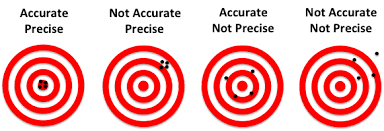The Distinction Between Precision and Accuracy
When it comes to measurements and data analysis, precision and accuracy are two crucial concepts that are often misunderstood or used interchangeably. However, they have distinct meanings and play different roles in determining the reliability of results.
Precision
Precision refers to the level of consistency or repeatability in obtaining a set of measurements. A measurement is considered precise if repeated trials yield similar results, regardless of how close those results are to the true value. In other words, precision is about the reproducibility of data points.
Accuracy
Accuracy, on the other hand, relates to how close a measured value is to the true or accepted value. It reflects the degree of correctness in a measurement and indicates how well a measurement reflects reality. An accurate measurement may not be precise if it consistently misses the true value by the same amount.
The Difference
The key difference between precision and accuracy lies in their focus: precision concerns consistency and reproducibility, while accuracy focuses on correctness and closeness to the true value. In essence, precision is about variation among measurements, whereas accuracy is about deviation from the actual value.
Importance in Science and Engineering
In scientific research, both precision and accuracy are essential for drawing valid conclusions. A high level of precision ensures that experimental results can be reliably reproduced, while accuracy guarantees that those results reflect reality as closely as possible. In engineering fields, such as manufacturing or construction, achieving both precision and accuracy is critical for ensuring quality control and meeting specifications.
Conclusion
In summary, precision and accuracy are distinct but complementary aspects of measurement quality. While precision indicates consistency in data collection, accuracy measures closeness to the true value. Understanding these concepts is vital for producing reliable data, making informed decisions, and advancing knowledge across various disciplines.
Understanding the Difference Between Accuracy and Precision: Examples, Formulas, and Class 11 Concepts
- What is the difference between accuracy and precision with example?
- What is the difference between precision and accuracy formula?
- What is the difference between accuracy and precision Class 11?
What is the difference between accuracy and precision with example?
The difference between accuracy and precision is often a common point of confusion in various fields. Accuracy refers to how close a measured value is to the true or accepted value, indicating the correctness of a measurement. On the other hand, precision relates to the consistency and reproducibility of measurements, regardless of their closeness to the true value. An example that illustrates this difference is shooting at a target: accuracy would be hitting the bullseye (close to the intended target), while precision would be hitting the same spot repeatedly, even if it’s not exactly on the bullseye. In this scenario, accuracy reflects how well shots align with the desired outcome, while precision shows how tightly grouped those shots are. Understanding this distinction is crucial for ensuring reliable and meaningful results in scientific experiments, data analysis, and various measurement processes.
What is the difference between precision and accuracy formula?
The difference between precision and accuracy lies in their definitions and how they are measured. Precision refers to the consistency or repeatability of measurements, indicating how closely individual results agree with each other. It is typically quantified by calculating the standard deviation or variance of a set of measurements. Accuracy, on the other hand, pertains to how close a measured value is to the true or accepted value. It is often evaluated by comparing the average measurement to a known standard or reference point. While precision focuses on the scatter of data points, accuracy assesses the proximity of those points to the target value. In summary, precision is about variation within data sets, while accuracy concerns correctness relative to an established benchmark.
What is the difference between accuracy and precision Class 11?
In the context of Class 11 studies, the distinction between accuracy and precision is a fundamental concept that students often encounter. Accuracy in this context refers to how close a measured value is to the true value or accepted standard. On the other hand, precision pertains to the level of consistency and reproducibility in obtaining multiple measurements. Understanding this difference is crucial for conducting experiments, analysing data, and drawing valid conclusions in scientific studies at the Class 11 level. By grasping the nuances between accuracy and precision, students can enhance their experimental skills and ensure the reliability of their results in various scientific disciplines.

